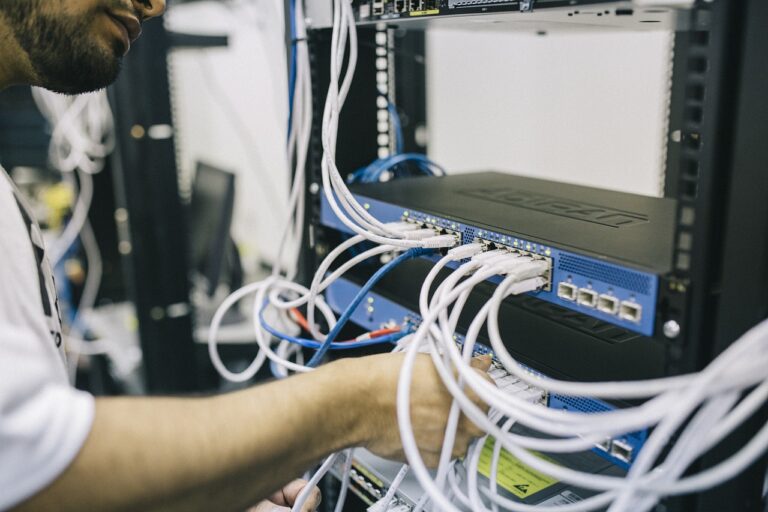How to become A Network Engineer
Are you ready to embark on a rewarding journey in network engineering? Let’s dive in.
Introduction on how to become a network engineer.
How Network Engineers Ensure Seamless Communication


Network engineers, often referred to as network architects, work behind-the-scenes to make sure that our digital lives run smoothly. They’re the backbones of our increasingly connected world, keeping networks efficient, secure, and functional.
Firstly, they design and implement both the hardware and software of network systems. This involves choosing the appropriate data communication components and configuring them to meet the specific needs of the organization. They also ensure that the network can adapt and scale as the organization grows, avoiding bottlenecks that can disrupt communication.
Secondly, they monitor the network to ensure it’s running at peak performance. They use a variety of tools and software to analyze network data, identify potential issues, and fix problems before they impact users. This could include anything from managing bandwidth to ensure fast, efficient communication, to identifying potential security vulnerabilities and mitigating them.
And finally, network engineers are responsible for maintaining the network. This includes performing regular updates and upgrades, troubleshooting issues, and even recovering data in case of network failure. They are often on call, ready to address network issues that arise at any time of day or night.
In essence, network engineers lay the groundwork for seamless, uninterrupted digital communication. They allow us to surf the web, stream our favorite shows, and connect with friends and colleagues around the world, all without giving a second thought to the complex network infrastructure that makes it all possible.
The role is crucial in today’s tech driven world.


In today’s interconnected world, the role of a network engineer is more critical than ever. These professionals serve as the architects of the digital infrastructure that underpins nearly every aspect of modern life.
From facilitating global communication and commerce, to supporting critical public services and powering our personal devices, network engineers keep our digital world running smoothly. They are the unseen heroes who ensure that networks are secure, efficient, and resilient, enabling us to connect, share, and learn in ways that were unthinkable just a few decades ago.
Their work impacts every sector, from business and education, to healthcare and entertainment, making their role not only crucial, but indispensable in our tech-driven world.
Section 1: Understanding Network Engineering
Network engineers build and maintain networks.


Network engineers are the architects of the digital landscape, responsible for creating, maintaining, and optimizing a complex web of connections that allow data to travel around the world.
They start by designing the network infrastructure, which involves determining the layout and specifications of routers, switches, and servers, among other hardware elements.
This design phase requires careful planning to meet the organization’s needs while ensuring security and scalability.
Once the design is finalized, network engineers implement the network by installing and configuring the hardware and software components. They create pathways for data to follow, establish security protocols, and configure settings to optimize network performance.
After the network is up and running, the role of the network engineer shifts to maintenance. They monitor network performance, troubleshoot issues, and perform regular software updates and hardware upgrades to keep the network current with technological advancements. They also enact security measures to protect against cyber threats.
Lastly, network engineers play an essential role in disaster recovery. If a network failure occurs, they work to quickly restore services and minimize downtime.
They also analyze the incident to strengthen the network’s resilience against future failures. Their skills and expertise ensure the smooth and secure operation of the digital networks we rely on every day.
Familiarize yourself with the OSI model
Understanding the OSI model is a fundamental aspect of becoming a network engineer. This model serves as the backbone of all networking studies, providing a conceptual framework that defines network communication. By familiarizing yourself with the seven layers of the OSI model – from physical to application – you gain insight into how data packets move through a network.
This knowledge is crucial when designing, implementing, and troubleshooting network systems. It allows you to pinpoint where issues may arise and devise efficient solutions. Additionally, a solid understanding of the OSI model equips you to better interact with other professionals in the field, since this model serves as a universal language among network engineers.
Moreover, most networking certifications, like CompTIA Network+ and CCNA, place a strong emphasis on the OSI model. Therefore, a comprehensive understanding of this model is not just beneficial but essential in your journey to becoming a competent network engineer.
Section 2: Educational Requirements


A bachelor’s degree is a common starting point.
Most aspiring network engineers start their career journey with a bachelor’s degree in computer science, information technology, or a related field. These degree programs equip students with a solid foundation in core IT concepts, including data structures, software development, and computer systems. More importantly, they delve into specialized topics critical to network engineering such as data communication, network design, and network security. This theoretical and practical knowledge prepares graduates for entry-level roles in the field, serving as a stepping stone to more advanced positions. Furthermore, many employers consider a bachelor’s degree as a minimum educational requirement for network engineer roles, making it a critical component of your professional journey. Ultimately, a bachelor’s degree can open doors to opportunities and provide the essential knowledge and skills required to succeed as a network engineer.
Major in computer science or related field.
Choosing to major in computer science or a related field can significantly bolster your networking career. These programs delve deep into the intricacies of computing, including areas like programming, algorithms, data structures, and more. As a major, you’ll gain hands-on experience with critical networking concepts such as TCP/IP, routing, and switching, which are fundamental to a network engineer’s role. Additionally, the problem-solving and analytical skills developed through such a major are invaluable when diagnosing network issues or designing reliable, efficient networks. The breadth and depth of knowledge acquired can enhance your credibility in the field, setting you up for progression and success in your network engineering career.
Section 3: Certifications Matter


CompTIA Network+
The CompTIA Network+ certification is a vital credential for any aspiring network engineer. It validates your ability to design, manage, and troubleshoot wired and wireless networks. Having this certification under your belt demonstrates to employers that you possess the fundamental skills necessary for a networking career. It covers key areas such as network security, network operations, and network troubleshooting. Earning the CompTIA Network+ certification can not only boost your resume but also enhance your understanding and command of networking principles. In a competitive job market, this certification can be a key differentiator, setting you ahead of your peers.
Cisco CCNA
Cisco’s CCNA certification is another valuable credential for network engineers. It covers areas such as network access, IP connectivity, IP services, security fundamentals, and automation and programmability. The certification also includes hands-on labs to provide practical experience working with Cisco equipment. Holding a CCNA certification can open doors to high-paying entry-level jobs in networking and pave the way for more
Juniper JNCIA
The Juniper Networks Certified Associate (JNCIA) certification is designed to validate your proficiency in networking fundamentals and working with Juniper equipment. It covers topics such as routing, switching, and basic network security. Holding a JNCIA certification can demonstrate your expertise in working with a specific vendor’s products, making you an attractive candidate for organizations that use Juniper devices.
Section 4: Developing Technical Skills
Master network protocols (TCP/IP, DNS).
As a network engineer, it is essential to have a deep understanding of protocols such as TCP/IP and DNS. These are the building blocks of modern networks and are used to communicate between devices. Having a thorough knowledge of these protocols will allow you to troubleshoot network issues more effectively and design efficient network architectures.
You can learn about TCP/IP and DNS through various online tutorials, courses, and hands-on practice. Understanding how these protocols function will also help you in preparing for certification exams.
In today’s world, network engineers need to have a strong understanding of coding and automation. With the rise of Software-Defined Networking (SDN) and Network Functions Virtualization (NFV), knowledge of programming languages such as Python
Learn routing and switching.


Routing and switching are fundamental concepts in networking that every network engineer should be familiar with. Routing is the process of directing traffic between different networks, while switching involves forwarding data within a network. Having a thorough understanding of routing and switching protocols will enable you to design and troubleshoot complex networks.
To develop your skills in routing and switching, you can enroll in courses or certifications such as Cisco CCNA or Juniper JNCIA. These certifications will not only teach you about routing and switching but also introduce you to other essential networking concepts.
Familiarize yourself with network security.
Network security is becoming increasingly crucial in today’s digital landscape. With the rise of cyber threats, organizations are looking for network engineers who can ensure the security of their networks.
Section 5: Hands-On Experience
Internships offer practical knowledge.
Internships are an excellent way to gain hands-on experience in the field of networking. Many organizations offer internship programs where you can work alongside experienced network engineers and learn from them.
Additionally, internships provide you with valuable practical knowledge that cannot be obtained through books or courses. You will have the opportunity to work on real-world projects, troubleshoot issues, and see how networks are built and maintained in a professional setting.
Build your own home lab.
Building a home lab is another great way to gain practical experience as a network engineer. You can purchase used networking equipment or set up virtual labs using software such as GNS3 or Cisco Packet Tracer.
With a home lab, you can practice configuring different types of networks, testing out new technologies
Work on real projects whenever possible.
As you gain more experience, try to work on real projects whenever possible. This could be through internships, freelance opportunities, or even personal projects for friends or family.
Working on real projects will not only enhance your technical skills but also give you a taste of the challenges and problem-solving involved in being a network engineer.
Network with other professionals.
Networking is essential in any field, and networking with other network engineers can open up new opportunities for you. Attend conferences, workshops, and seminars to meet other professionals in the field.
You can also join online communities or forums to connect with fellow network engineers. These connections can be valuable when looking for job opportunities or seeking advice.
Section 6: Soft Skills for Success
Communication is key.
As a network engineer, it is crucial to have strong communication skills. You will be working with various teams and clients, so being able to effectively communicate technical information in a clear and concise manner is essential.
Additionally, as technology continues to advance rapidly, it is essential to stay updated with the latest industry trends and developments. This requires constant learning and self-improvement.
Problem-solving skills are vital.
Network issues and outages can occur at any time, and as a network engineer, it is your responsibility to troubleshoot and resolve them quickly. This requires strong problem-solving skills and the ability to think critically under pressure.
To develop these skills, you can practice solving technical challenges on online platforms or participate in hackathons. These experiences will not only enhance your problem-solving abilities but also give you a chance to showcase your skills to potential employers.
Section 7: Navigating the Job Market
Job boards and networking events.
When you feel ready to enter the job market as a network engineer, there are a few key strategies to keep in mind.
Firstly, be sure to regularly check job boards and company websites for open positions. Many companies also attend career fairs or host networking events where you can meet hiring managers and discuss opportunities.
Showcase your skills on LinkedIn.
LinkedIn is a valuable tool for job seekers, especially in the tech industry. Make sure your profile is up-to-date and highlights your technical skills and qualifications. Join relevant groups and participate in discussions to expand your network and stay updated with industry news. Employers often search for candidates on LinkedIn, so having a strong profile can increase your visibility and chances of being noticed.
Section 8: Building a Resume and Portfolio
Highlight your certifications.
Certifications are a crucial aspect of becoming a network engineer. They not only validate your technical knowledge but also demonstrate your dedication to the field. As mentioned earlier, popular certifications for network engineers include Cisco Certified Network Associate (CCNA) and CompTIA Network+. Be sure to list these prominently on your resume and LinkedIn profile.
Showcase your achievements.
In addition to certifications, be sure to highlight any relevant experience or projects you have completed. This could include internships, freelance work, or personal projects. Employers want to see practical skills and problem-solving abilities in action, so be specific and provide concrete examples.
Section 9: Nailing the Interview
Be prepared for technical questions.
Network engineering interviews often include technical questions to assess your knowledge and problem-solving skills. Be prepared to answer questions about network protocols, troubleshooting methods, and how you would approach specific scenarios. Practice with a friend or through online resources to build confidence and improve your responses.
Emphasize soft skills.
While technical skills are critical for a network engineer, employers also look for candidates with strong soft skills. These include communication, teamwork, and time management. Be prepared to talk about how you have used these skills in previous experiences or how you plan to apply them in a network engineering role.
Show your enthusiasm.
Employers want to see that you are passionate about becoming a network engineer and joining their team. Express your interest and excitement for the position, and be sure to ask questions during the interview to demonstrate your curiosity and eagerness to learn.
Demonstrate your problem-solving abilities.
Network engineering requires quick thinking and creative problem-solving. Use your interview to showcase these skills by discussing how you have approached and solved challenging network issues in the past.
Section 10: Advancing in Your Career
Consider specializing (security, cloud).
As a network engineer, you have the opportunity to specialize in various areas such as security or cloud computing. Consider obtaining additional certifications or taking courses to expand your skills and increase your marketability in these specialized fields.
Pursue higher-level certifications.
Continuing education is crucial for network engineers, and pursuing higher-level certifications can open up new opportunities for career advancement and salary increases. Some examples of advanced certifications include Cisco Certified Internetwork Expert (CCIE) and Juniper Networks Certified Internet Professional (JNCIP).
Continue learning and stay updated.
Technology in the networking field is constantly evolving, so it’s important to stay updated with the latest developments and advancements. Attend conferences, workshops, and training sessions to continue learning and expanding your knowledge base. This will not only make you a more valuable asset to your current company, but it will also increase your chances of landing new and exciting opportunities in the future.
Conclusion:
Becoming a network engineer takes dedication.
Whether you’re just starting your journey or already working in the field, it’s important to stay motivated and focused on your goals. Network engineering offers a lucrative and fulfilling career with endless opportunities for growth and advancement. By following the steps outlined in this article, you can set yourself up for success and become a highly skilled and sought-after network engineer. Remember to continue learning,
Embrace the journey and enjoy the rewards.
The path to becoming a network engineer may not be easy, but the rewards are well worth it. With hard work, determination, and continuous learning, you can achieve your goals and have a successful career in this dynamic and ever-evolving field. So don’t be afraid to take that first step and start your journey towards becoming a network engineer today. Your future self will







